Challenges of Covid-19 on crane and rigging
03 April 2020
It’s hard to find any good news in the Covid-19 crisis. As American Cranes & Transport’s April issue went to press, most communities in the United States are on lockdown, sheltering in place to try to “flatten the curve” of the virus spreading.
The U.S. Congress passed a $2 trillion-dollar economic stimulus package while the government deemed workers in the crane, rigging and specialized transportation industry as “essential,” exempt from jobsite shutdowns due to the pandemic. But some jobs were shut down anyway and unemployment in all sectors is growing.

Despite the “essential worker” designation, the crane, rigging and specialized transportation sector is preparing for layoffs, seeing projects delayed or cancelled and have generally assessed that the economic downturn due to the Covid-19 virus will be damaging. But they are hoping the duration will be short.
D.Ann Shiffler talked to Maxim Crane Works COO Frank Bardonao about how his company is addressing the challenges of the Covid-19 crisis.
Frank Bardonaro is chief operating officer at Maxim Crane Works, the largest crane rental company in the United States and one of the biggest in the world. Based in Bridgeville, Pennsylvania, Maxim has more than 50 locations and branches, and its cranes operate at construction sites across the country. What are the challenges for Maxim in addressing the Covid-19 crisis?
“First and foremost is the human element, it’s affected billions of people around the world, our number one priority is to take care of our employees and their families. We are doing everything we need to do to maintain a culture of safety with all the protocols, social distancing, extra cleaning of the equipment, controls, changing the way we get job tickets signed, always maintaining that distance in any way we can and making sure that if anyone sees something they say something.”
He said as an essential service provider, Maxim is working with utility companies, power companies, hospitals, medical entities, communications companies and many critical infrastructure projects.
“We are in these spaces throughout the country and we need to be focused on providing our services in a safe and efficient manner,” Bardonaro said.
ACT conducted a short digital readership survey on 18 March and the results showed a wary industry hoping for the best. Some 49 percent of respondents said they have not had projects cancelled, 34 percent have had projects cancelled and 17 percent said they didn’t know. As far as jobsite shutdowns, 44 percent said they had not had a job shutdown, 44 percent said they had a jobsite shutdown and 12 percent don’t know. In terms of project delays and rescheduling, 68 percent said they had seen delays or postponements, 29 percent said they had not seen delays or postponements and 2 percent didn’t know. In terms of expected short term staff layoffs, 51 percent said they expect to see layoffs, 34 percent didn’t know and 15 percent don’t expect layoffs.
Finally, 41 percent said they don’t know if crane rental rates have been impacted, 32 percent said they have been impacted and 27 percent said they have not been impacted.
The Specialized Carriers and Rigging Association (SC&RA) has taken a strong leadership role, disseminating information through its website: SC&RA COVID-19 Crisis Command Center. SC&RA cancelled its Annual Conference slated for April 14-19 in Amelia Island, Florida, USA.
With safety as the cornerstone of the industry, SC&RA CEO, Joel Dandrea, said the association will endeavour to keep members informed and do what it can do to help members survive the business repercussions of this crisis. “I encourage you to be safe and practice social distancing now through the next few weeks,” said Dandrea. “Our motto is ‘Our Members Lift & Move the World’ and I have no doubt that if we do our part, we can impact the spread of this virus and be stronger, physically, emotionally and financially.”
Buckner HeavyLift’s Meredith Williams said that Buckner has worked the last several years setting up web and cloud-based systems that can support its team remotely and allow for the flexible work structure that a situation like this requires. “From payroll to time tickets to crane inspections, we are able to leverage our digital systems to help the information flow among our company and to our customers stay steady,” she said.
Still, she said her team feels the anxiety and stress, especially with field teams who have the added challenge of being away from home and family. “Our main goal as a company is to support those field teams as they continue to support our customers’ projects,” she said. “We have implemented increased daily communication channels throughout our teams to make sure we have a pulse of what’s happening in all areas of our business and the country. Covid-19 precautions and challenges certainly reinforce Buckner’s appreciation, respect and value placed upon our frontline field personnel. These men and women continue to perform at the highest level despite the challenges, which only further confirms that they are truly the backbone of our company and the industry.”
Jason MacKenzie, Select Crane Sales president, said his company is taking all the necessary precautions. “For the time being our territory reps are working from home and assisting customers by phone and email,” he said. “To accommodate customers, we are offering virtual crane demos for those finding it difficult to travel. Our customers are still very busy for the most part and getting as much work completed in the event that they are forced to quarantine/stop working for a period of time.”
MacKenzie said his company has not seen an increase nor decline in the number of inquiries, as of yet. “Customers are holding tight right now until we have a better grasp on how long the quarantines will remain in effect and the virus is under control,” he said. “There is a large concern for the economic impact and how long it will take to recover. I think the next few months will remain quiet until the world works to get back to some sort of normality. The crane industry and people within the industry are strong and this is just another challenge.”


